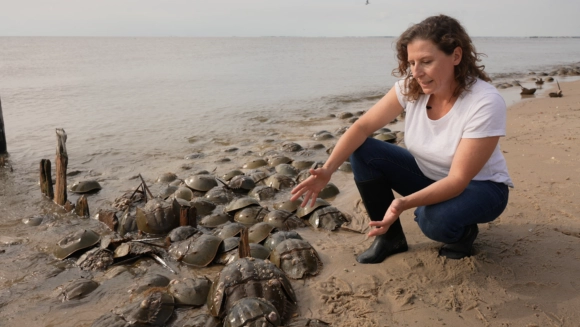Marine ecologist Daphne Munroe, associate professor in the Department of Marine and Coastal Sciences in the School of Environmental and Biological Sciences, has a deep respect for New Jersey’s Delaware Bay and its unique ecosystem that supports an abundance of life. Munroe, a shellfish researcher working out of the Haskin Shellfish Research Laboratory in Port Norris, is interested in the ways that New Jersey’s coastal environment supports a wide range of shellfish species. She is also interested in our oceans’ potential to support sustainable shellfish aquaculture as a source of healthy protein for people and to promote food security.
“Delaware Bay is an ideal environment for shellfish but it is also being impacted by climate change,” says Munroe. “These waters are also very important for horseshoe crabs, birds and oyster farms that help stabilize the shoreline and provide habitat for a variety of fish species.”
Every summer, Munroe watches in awe as millions of horseshoe crabs migrate to New Jersey’s beaches to spawn and lay their eggs. The horseshoe crabs in turn support migratory birds, such as the threatened red knots, that stop over on New Jersey shores just as the crabs are spawning and feed on their eggs. Conservation groups had expressed concern that rack and bag oyster farms might inhibit horseshoe crabs’ journey to spawn on beaches.
Munroe and her team of scientists decided to investigate the potential impact of rack and bag oyster farming on horseshoe crabs and their ability to reach beaches and spawn. Their research into this relationship between horseshoe crab migration and rack and bag oyster farms has been documented in the student-authored science-in-action story, Life on the Edge: Exploring New Jersey’s Coastal Ecosystem, that includes interviews with the New Jersey Audubon Society.
“It’s important to look at the results of scientific research,” says Gretchen Whitman, center director at New Jersey Audubon, who is featured in the film. “It’s important for scientists, oyster farmers and conservationists to listen to each other.”
SEBS undergraduate students Angie Catt, Natalie Radu and Micah Seidel directed and edited this science video story as part of their independent research in marine food systems. View trailer here.
Life on the Edge: Exploring New Jersey’s Coastal Ecosystem has been accepted into four film festivals. It was recently screened at the CUT International Short Film Festival in Millville, NJ, and will be part of the upcoming Wildlife Conservation Film Festival in Boston and Florida.
Full article at Rutgers Newsroom

